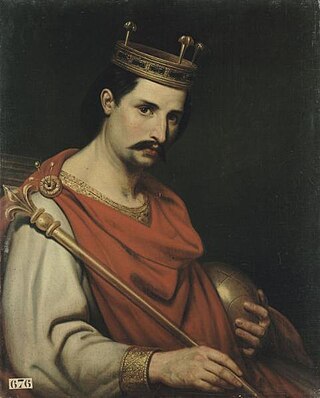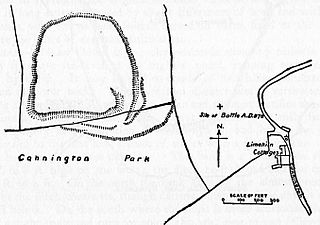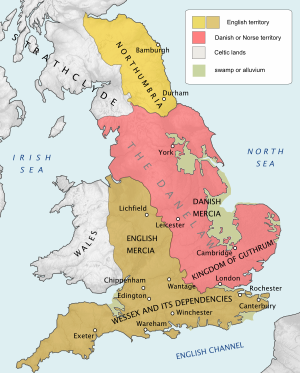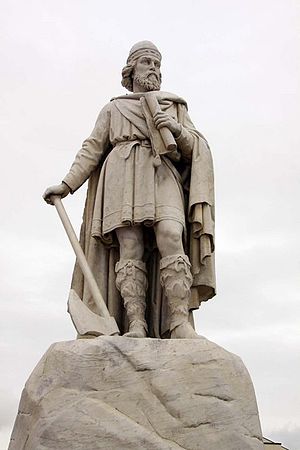The 870s decade ran from January 1, 870, to December 31, 879.
The 880s decade ran from January 1, 880, to December 31, 889.

Year 871 (DCCCLXXI) was a common year starting on Monday of the Julian calendar.

Year 875 (DCCCLXXV) was a common year starting on Saturday of the Julian calendar.

Year 870 (DCCCLXX) was a common year starting on Sunday of the Julian calendar, the 870th year of the Common Era (CE) and Anno Domini (AD) designations, the 870th year of the 1st millennium, the 70th year of the 9th century, and the 1st year of the 870s decade.
Year 877 (DCCCLXXVII) was a common year starting on Tuesday of the Julian calendar.

Year 879 (DCCCLXXIX) was a common year starting on Thursday of the Julian calendar.

The Danelaw was the part of England between the early tenth century and the Norman Conquest under Anglo-Saxon rule in which Danish laws applied. The Danelaw originated in the conquest and occupation of large parts of eastern and northern England by Danish Vikings in the late ninth century. The term applies to the areas in which English kings allowed the Danes to keep their own laws following the tenth-century English conquest in return for the Danish settlers' loyalty to the English crown. "Danelaw" is first recorded in the early 11th century as Dena lage.
Guthrum was King of East Anglia in the late 9th century. Originally a native of Denmark, he was one of the leaders of the "Great Summer Army" that arrived in Reading during April 871 to join forces with the Great Heathen Army, whose intentions were to conquer the kingdoms of Anglo-Saxon England. The combined armies were successful in conquering the kingdoms of East Anglia, Northumbria, and parts of Mercia, and overran Alfred the Great's Wessex, but were ultimately defeated by Alfred at the Battle of Edington in 878. The Danes retreated to their stronghold, where Alfred laid siege and eventually Guthrum surrendered.

At the Battle of Edington, an army of the kingdom of Wessex under Alfred the Great defeated the Great Heathen Army led by the Dane Guthrum sometime between 6 and 12 May 878, resulting in the Treaty of Wedmore later the same year. Primary sources locate the battle at "Eðandun". Until a scholarly consensus linked the battle site with the present-day village of Edington in Wiltshire, it was known as the Battle of Ethandun. This name continues to be used.
The Treaty of Wedmore is a 9th century agreement between King Alfred the Great of Wessex and the Viking king, Guthrum the Old. The only contemporary reference to the treaty is that of a Welsh monk, Asser, in his biography of Alfred, known as Vita Ælfredi regis Angul Saxonum, or "The Life of King Alfred", in which Asser describes how after Guthrum's defeat at the Battle of Edington, followed by his surrender some days later, he agreed to a peace treaty with Alfred. The treaty was conditional on Guthrum's being baptised to endorse the agreement, as well as to allow him to rule more legitimately over his Christian vassals but to remain pagan to his pagan vassals. Also, Guthrum and his army were to leave Wessex.

The Battle of Cynwit or Countisbury Hill took place between West Saxons and Vikings in 878. The location of the fortress the battle is named for is not known with certainty but probably was at Countisbury Hill or Wind Hill, near Countisbury, Devon. A possible alternative site for the siege and battle is Cannington Camp in the Parrett estuary near Combwich.

The Great Heathen Army, also known as the Viking Great Army, was a coalition of Scandinavian warriors who invaded England in 865 AD. Since the late 8th century, the Vikings had been engaging in raids on centres of wealth, such as monasteries. The Great Heathen Army was much larger and aimed to conquer and occupy the four kingdoms of East Anglia, Northumbria, Mercia and Wessex.

The Last Kingdom is the first historical novel in The Saxon Stories by Bernard Cornwell, published in 2004. This story introduces Uhtred of Bebbanburg, a Saxon noble who is kidnapped by Danish Vikings as a young child and is assimilated into their culture, religion and language before a series of events lead him into the service of King Alfred of Wessex and his participation in multiple battles, including the notable Battle of Cynwit before the book's conclusion.

The Pale Horseman is the second historical novel in The Saxon Stories by Bernard Cornwell, published in 2005. It is set in 9th century Wessex and Cornwall.
Events from the 9th century in England.
Events from the 9th century in Ireland.
Odda, also known as Oddune, was a ninth-century ealdorman of Devon. He is known for his victory at the Battle of Cynwit in 878, where his West Saxon forces defeated a Viking army led by Ubba, brother of the Viking chiefs Ivar the Boneless and Halfdan Ragnarsson.

Wulfhere was Ealdorman for Wiltshire, when the Anglo-Saxon kingdoms, of England, were experiencing turbulent times. An invading Danish army had landed in East Anglia, in 865 and had conquered all of the English kingdoms apart from Wessex. The Danish king Guthrum was overrunning the kingdom of Wessex, with Alfred, king of Wessex in retreat. The county of Wiltshire was part of Wessex and on its northern border was Danish held Mercia. Evidence from the charters of the time suggests that Wulfhere came to an arrangement with the Viking Guthrum rather than remain loyal to Alfred. When Alfred was able to regain control of his kingdom, Wulfhere was held to account.
The Battle of Chippenham was a January 878 battle between a Viking army led by Guthrum and an Anglo-Saxon army led by Alfred the Great. The Vikings forced Alfred to flee Chippenham and managed temporarily to gain control over most of Wessex.












